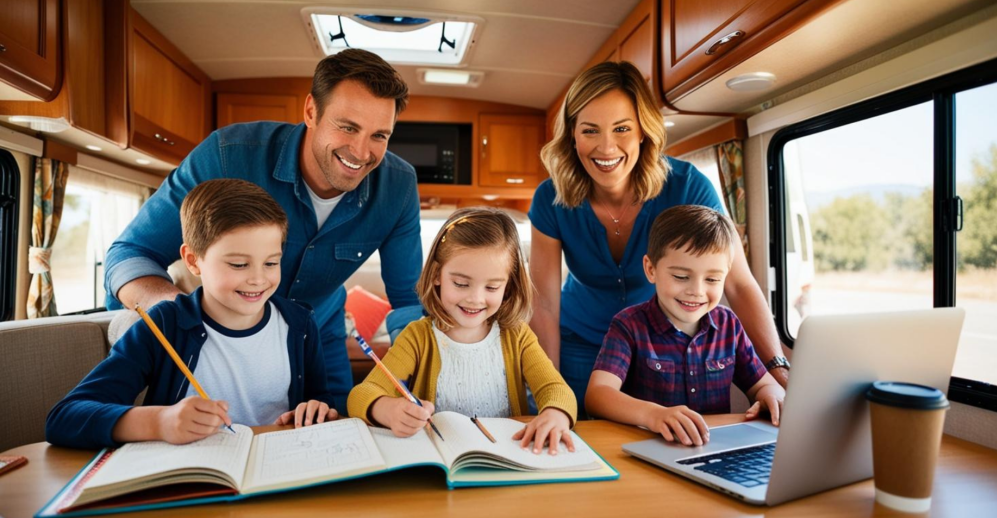Embarking on the full-time RV lifestyle with my wife for 3.5 years was an adventure unlike any other. From November 2020 to May 2024, we crisscrossed the country three times, creating unforgettable memories and forging deeper connections with family while exploring some of America’s most iconic destinations. Our journey took us from Arizona to Texas, New York, Oregon, and California, with awe-inspiring stops along the way, including Mt. Rushmore, the Black Hills of South Dakota, Glacier National Park, Saguaro and Yosemite National Parks, the Kentucky Bourbon Trail, and the stunning Letchworth and Watkins Glen State Parks in New York.
Full-time RV life was both exhilarating and challenging—filled with joy, discovery, and the occasional reminder of the close quarters we called home. Through it all, we embraced the freedom and experiences that this unique lifestyle offered.
As you consider living and traveling full-time in an RV you will want to consider a few things. Hopefully the following will give you some information needed to make an informed decision.
Preparing Kids for the Journey Ahead
Living in an RV full-time with kids is a lesson in adaptability and creativity. Adjusting to the compact space means your family needs to become super organizers. A good starting point is decluttering. Keep only what you need and what sparks joy—Marie Kondo would be proud.
Establishing a routine can be a game-changer. Kids thrive on consistency, so carve out a schedule that balances school, chores, meals, and playtime. This helps manage the day-to-day, making the new lifestyle feel a bit more predictable and less chaotic.
Designate personal spaces for your kids within the RV. Even if it’s a small nook, having a spot they can call their own gives kids a sense of security. Involve them in decorating or organizing their areas to make it feel special.
Incorporate your kids into the adventure planning process. Involve them in picking destinations or activities, which helps ease any initial resistance to the whole RV idea. Plus, it builds excitement for the journey ahead and fosters teamwork!
Roadschooling: Education on the Move

Homeschooling on the road, often called roadschooling, offers the flexibility traditional schooling can’t. The key is to integrate your travel experiences into educational moments. Discovering natural wonders, exploring historical sites, or visiting museums aren’t just fun—they’re invaluable learning opportunities.
Curriculum can be more fluid to adapt to your journeys. You might decide today’s math lesson involves measuring the distance to your next stop, or perhaps last night’s campfire talk turns into a science study on constellations. The balance lies in keeping core subjects on track while embracing these spontaneous lessons.
Technology is your best friend here. Online resources and educational apps allow for flexibility, letting you stay connected with more structured learning as needed. Balance screen time with hands-on experiences to keep learning dynamic and engaging.
Don’t forget to let your kids’ interests guide some of the learning. Roadschooling is the perfect platform to dive into what they’re curious about, making education more relevant and exciting for them as they weave through different landscapes and cultures.
Building and Maintaining Connections
Staying social while living on the road requires a bit of effort but it’s crucial for both kids and adults. Technology makes it easier than ever to keep in touch with friends and family. Regular video calls can be heartwarming, while social media lets you share your adventures in real time.
Tap into the community of other full-time RV families like Fulltime Families. Online groups and forums are excellent places to swap tips, share experiences, and maybe even arrange meet-ups. Kids, especially, will benefit from forming friendships with other children who understand the lifestyle.
Another way to build connections is through RV rallies and campground activities. These events are filled with people who love the road as much as you do. They offer a sense of camaraderie and are great for meeting folks with similar interests.
Don’t underestimate the simple joy of sending a postcard. It’s a small gesture that can mean a lot to someone back home. Plus, it’s a fun way for kids to practice writing skills while keeping loved ones updated on their travels.
Embracing the Journey: Blending Travel with Daily Life
Balancing adventure with everyday life is key to enjoying full-time RV living. Traveling slowly can make a difference in preventing burnout and keeping the journey enjoyable for everyone. It allows time to truly enjoy each location and makes the overall experience fulfilling.
Managing clutter in an RV requires smart use of storage solutions. Opt for items that serve multiple purposes and teach kids the value of owning fewer quality toys. Accept that messes will happen, but they’re a small price for the freedom of the road.
Plan your travel days wisely. Break up long stretches with stops for rest and make sure to bring along low-mess snacks that kids can enjoy on the move. Keeping a bag of travel-friendly activities for the kiddos can turn long drives into peaceful experiences.
It’s important to embrace the unique aspects of RV living. While it might be unconventional compared to a stationary lifestyle, the benefits—like enriching family time and exposing kids to new cultures—are invaluable and lengthy.
Let go of the comparison trap. Focus on what makes your journey special. Celebrate the learning opportunities and memories you’re creating together. The RV lifestyle offers a distinctive way of living that’s filled with adventures and countless stories to tell.
FAQs About Full-Time RV Living With a Family
1. Can you live full time in an RV with family?
Yes, living full time in an RV with your family is entirely possible and can be a rewarding lifestyle. Many families choose this option to explore the country, spend more time together, and simplify their lives. It requires careful planning, organization, and communication, especially in smaller spaces, but it can lead to amazing experiences and memories.
2. What is the best RV for full-time living with family?
The best RV for full-time family living depends on your family’s size and needs. Popular choices include:
- Class A Motorhomes: Spacious and luxurious, with plenty of room for larger families.
- Fifth Wheels: Ideal for families needing separate sleeping areas and home-like amenities.
- Class C RVs: A more affordable option with bunk beds and practical layouts.
- Travel Trailers: Versatile and budget-friendly, suitable for families who don’t need a motorized vehicle.
Consider factors like the number of sleeping areas, storage, kitchen size, and overall livability when choosing your RV.
3. What is a good budget for full-time RV living?
A good budget for full-time RV living can range from $2,000 to $5,000 per month, depending on your lifestyle, the size of your family, and travel frequency. Key expenses include:
- RV payments or purchase costs
- Campground or RV park fees
- Fuel and maintenance
- Groceries, dining, and entertainment
- Insurance for the RV and health coverage
- Miscellaneous costs like internet, laundry, and activities
Tracking your expenses and adjusting as needed will help you stay on budget.
4. Is it financially smart to live in an RV?
Living in an RV can be financially smart if done thoughtfully. It often reduces housing expenses, allows for more flexibility, and can support a minimalist lifestyle. However, costs like RV maintenance, fuel, and park fees need to be managed carefully. For families seeking to travel or reduce traditional housing costs, RV living can offer significant financial and lifestyle benefits.
5. What is the downside of living in an RV full time?
While RV living has many benefits, there are some challenges to consider:
- Limited space for storage and privacy
- Frequent maintenance and repairs
- Potentially unstable internet connectivity for work or school
- Weather dependency (extreme cold or heat can be challenging)
- Finding and booking RV parks or campsites during busy seasons
- Adjusting to a less traditional lifestyle, which may not suit everyone
Planning and adaptability are key to overcoming these downsides.
6. Is RV living cheaper than owning a home?
RV living can be cheaper than owning a home, but it depends on how you approach it. By minimizing travel, choosing affordable RV parks, and controlling expenses, you can save money compared to a traditional home. However, frequent travel, expensive campgrounds, and unexpected RV repairs can add up. It’s often cheaper for those committed to a simple, cost-conscious lifestyle.
7. How much is an RV park per month?
Monthly RV park fees vary depending on location and amenities. On average:
- Basic RV parks: $300–$600 per month
- Mid-range parks with more amenities: $600–$1,200 per month
- Luxury resorts: $1,200 or more per month
Many RV parks offer discounts for long-term stays, which can help reduce overall costs.
About the Author
Jim has 3.5 years of experience living and traveling full-time in an RV. From “moochdocking” with family and friends to navigating the financial intricacies of RV life, he shares practical advice rooted in firsthand experience. His goal is to help fellow adventurers embrace the RV lifestyle with confidence and ease.

We’re three years into full-time RVing with our teenage son, and your insights on maintaining a social life for everyone are very helpful. It’s easy to become isolated, but we found ways to connect with other RV families and it’s helped tremendously.
Your point about internet access and keeping up to date on schooling is excellent – we had a couple of bumpy months working that out. I’m curious to know – what’s your favorite place you’ve visited so far, and why?
Thank you for your thoughtful comment! It’s great to hear that my insights resonated with you and that you’ve found ways to stay connected with other RV families—building that community can make such a difference. It sounds like you’ve found a good rhythm, even with the initial challenges of internet and schooling—those can definitely take some trial and error to get just right.
As for our favorite place to visit, we absolutely love the Black Hills, South Dakota. There’s just so much to see and do there, from marveling at the iconic Mt. Rushmore to exploring the beauty of Custer State Park and the fascinating underground world of Wind Cave National Park. The area offers a mix of history, adventure, and incredible scenery that keeps us coming back. If you haven’t been yet, I highly recommend it—it’s a great place to explore as a family!
Thanks again for sharing your journey. Wishing you many more memorable miles ahead!
Wow, Jim’s post brought back some amazing memories for me! I haven’t done full-time RV living myself, but I’ve had my fair share of long road trips and camping adventures, and I can absolutely relate to the mix of excitement and challenges he described. I love how he highlights the importance of adaptability, especially when it comes to living in close quarters and road schooling. The tips on decluttering and involving kids in the adventure planning are spot on, it’s a great way to keep everyone engaged and make the journey feel like a true family project. Reading this, I couldn’t help but imagine the incredible stories and bonds created during those 3.5 years on the road. Makes me wonder, Jim, what was the one place or moment that truly took your breath away?
Thank you so much for your thoughtful comment! I’m glad the post brought back great memories for you. Full-time RV living definitely creates unforgettable bonds and stories, and you’re absolutely right about the importance of adaptability and teamwork—it makes all the difference. One place that truly took my breath away was Yosemite’s Tunnel View. The sweeping vista of El Capitan, Half Dome, and Bridalveil Fall was just stunning, and it’s a moment I’ll never forget. If you ever get the chance to visit, I highly recommend it!